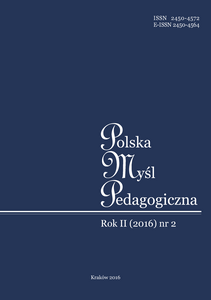Realizm filozoficzny Polskiej Szkoły Filozofii Klasycznej jako podstawa modelu wychowania otwartego na religię
Philosophical realism of the Polish School of Classical Philosophy as the basis for a model of education open to religion
Author(s): Maria M. BoużykSubject(s): Education, Metaphysics, Philosophy of Religion, Philosophy of Science
Published by: Wydawnictwo Uniwersytetu Jagiellońskiego
Keywords: Polish School of Classical Philosophy; realism; Jerzy Kalinowski; Stanisław Kamiński; Mieczysław A. Krąpiec; Marian Kurdziałek; Andrzej Maryniarczyk; Stefan Swieżawski; Karol Wojtyła; Zofia J.Zdybick;
Summary/Abstract: The article examines the problem of philosophical realism and its implications for the theory of education concerning the issue of religion. The analysis is based on the works of the Polish School of Classical Philosophy, which continues the tradition of ancient and medieval philosophers, primarily Aristotle and St. Thomas Aquinas. The School goes back to the late 1940's when, after World War II, the Catholic University of Lublin became a Mecca for researchers that represented realistic philosophical thought. The most important philosophers are Jerzy Kalinowski, Stanisław Kamiński, Mieczysław Albert Krąpiec, Marian Kurdziałek, A. Maryniarczyk, Stefan Swieżawski, Karol Wojtyła, and Zofia J. Zdybicka. The article consists of six parts. Part 1 explains the model of classical philosophy practiced by the School, which is wisdom oriented, and argues that this model contains the determinants of the model of education open to religion. Part 2 deals with a subject of cognition, as pointed out by the School, which criticizes Cartesian, Kantian and phenomenological philosophy (the so-called philosophy of reflection). The approach to the problem of reflection and the priority of objective cognition are the core of realism presented by the School. The issue of unity of being and thinking is further analyzed in Parts 3-4, which deal with the value of pre-scientific cognition and the object of philosophical cognition (the concept of being as being). Parts 2 to 4 show the impact of objective-oriented philosophy on the definition of religion proposed by the School. The specificity of the explanation related to the phenomenon of religion and education is examined in Parts 5 and 6 – while Part 5 addresses the problem of the objectivity of value (including sanctity), the focus of Part 6 is on the metaphysical character of this definition.
Journal: Polska Myśl Pedagogiczna
- Issue Year: 2/2016
- Issue No: 2
- Page Range: 215-229
- Page Count: 15
- Language: Polish

